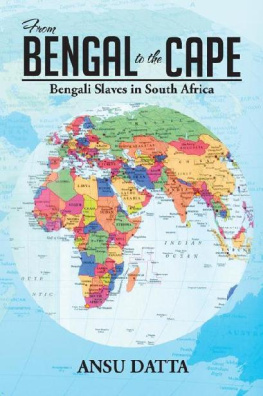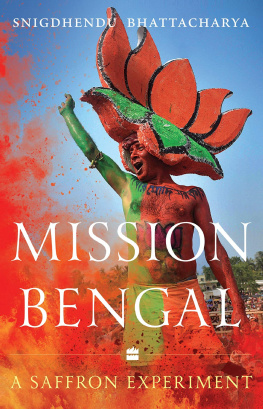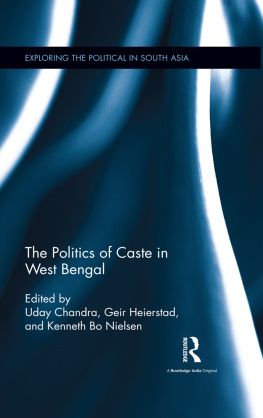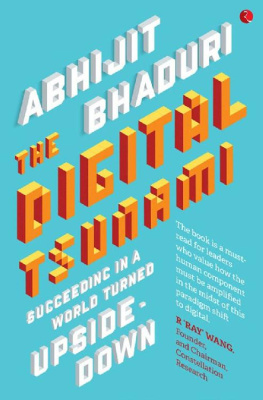Bhaduri Saugata - Polycoloniality: European Transactions with Bengal from the 13th to the 19th Century
Here you can read online Bhaduri Saugata - Polycoloniality: European Transactions with Bengal from the 13th to the 19th Century full text of the book (entire story) in english for free. Download pdf and epub, get meaning, cover and reviews about this ebook. publisher: Bloomsbury Publishing India Pvt. Ltd., genre: Home and family. Description of the work, (preface) as well as reviews are available. Best literature library LitArk.com created for fans of good reading and offers a wide selection of genres:
Romance novel
Science fiction
Adventure
Detective
Science
History
Home and family
Prose
Art
Politics
Computer
Non-fiction
Religion
Business
Children
Humor
Choose a favorite category and find really read worthwhile books. Enjoy immersion in the world of imagination, feel the emotions of the characters or learn something new for yourself, make an fascinating discovery.
- Book:Polycoloniality: European Transactions with Bengal from the 13th to the 19th Century
- Author:
- Publisher:Bloomsbury Publishing India Pvt. Ltd.
- Genre:
- Rating:4 / 5
- Favourites:Add to favourites
- Your mark:
- 80
- 1
- 2
- 3
- 4
- 5
Polycoloniality: European Transactions with Bengal from the 13th to the 19th Century: summary, description and annotation
We offer to read an annotation, description, summary or preface (depends on what the author of the book "Polycoloniality: European Transactions with Bengal from the 13th to the 19th Century" wrote himself). If you haven't found the necessary information about the book — write in the comments, we will try to find it.
Bhaduri Saugata: author's other books
Who wrote Polycoloniality: European Transactions with Bengal from the 13th to the 19th Century? Find out the surname, the name of the author of the book and a list of all author's works by series.
Polycoloniality: European Transactions with Bengal from the 13th to the 19th Century — read online for free the complete book (whole text) full work
Below is the text of the book, divided by pages. System saving the place of the last page read, allows you to conveniently read the book "Polycoloniality: European Transactions with Bengal from the 13th to the 19th Century" online for free, without having to search again every time where you left off. Put a bookmark, and you can go to the page where you finished reading at any time.
Font size:
Interval:
Bookmark:

POLYCOLONIALITY
POLYCOLONIALITY
European Transactions with Bengal from
the 13th to the 19th Century
SAUGATA BHADURI

BLOOMSBURY INDIA
Bloomsbury Publishing India Pvt. Ltd
Second Floor, LSC Building No. 4, DDA Complex, Pocket C 6 & 7,
Vasant Kunj New Delhi 110070
BLOOMSBURY, BLOOMSBURY ACADEMIC INDIA and the Diana logo are trademarks of
Bloomsbury Publishing Plc
First published in India 2020
This edition published 2020
Copyright Saugata Bhaduri, 2020
Saugata Bhaduri has asserted his right under the Indian Copyright Act to be identified as Author of this work
Bloomsbury Academic
An imprint of Bloomsbury Publishing Plc
All rights reserved. No part of this publication may be reproduced or transmitted in any form or by any means, electronic or mechanical, including photocopying, recording, or any information storage or retrieval system, without prior permission in writing from the publishers
Bloomsbury Publishing Plc does not have any control over, or responsibility for, any third-party websites referred to or in this book. All internet addresses given in this book were correct at the time of going to press. The author and publisher regret any inconvenience caused if addresses have changed or sites have ceased to exist, but can accept no responsibility for any such changes
ISBN: HB: 978-93-88271-41-7; eBook: 978-93-88271-42-4
2 4 6 8 10 9 7 5 3 1
Created by Manipal Digital
Bloomsbury Publishing Plc makes every effort to ensure that the papers used in the manufacture of our books are natural, recyclable products made from wood grown in well-managed forests. Our manufacturing processes conform to the environmental regulations of the country of origin.
To find out more about our authors and books visit www.bloomsbury.com and sign up for our newsletters
In memory of my mother
Contents
A project like this, especially one that has been in gestation and in continuous accumulation of more and more information for more than a decade, has so many people and organisations to thank for it, that I do not know where to beginwhom to thank first.
Let me offer my foremost thanks not to an individual person, but to an internet concern, archive.org, whose making available all kinds of rare and old books, and the most-difficult-to-track of sources, ready at ones fingertips has made a study like this possible.
I am deeply grateful for two grants that I received for conducting research on polycolonialitythe University Grants Commission - Deutscher Akademischer Austausch Dienst - Project-based Personnel-exchange Programme (UGC-DAAD-PPP) grant for the project Polycoloniality in India: Cultural Transactions with Europe from Early Modernity to the 19th Century, executed at the Georg-August-Universitt Gttingen, Germany, 20142016; and the Marie Curie International Research Exchange Scheme of the European Union: SPeCTReSS (Social Performances of Cultural Trauma and the Rebuilding of Solid Sovereignties) Grant, for the project From Cultural Trauma to Transnational Transactions: Polycolonial Translations in South Asia, with Focus on Bengal, executed at the Jagiellonian University, Krakw, Poland, 20172018.
Next, I thank Professor S.P. Ganguly, retired Professor of Spanish at JNU, whose invitation to me in January 2009 to present a paper at his conference on Multiculturalism: Spanish and Indian Scenario, set me off on the path to trace, to begin with, the Portuguese legacy in Bengal, which soon took the form of a full-blown study of polycoloniality involving the other non-English colonial presences in Bengal too.
In the decade that has passed by since then, during which a stray query took the form of a veritable obsession and which now has taken the shape of this book, I have been fortunate to have had the company of several amazing academic friends from all over the world, who have all had some role in the shaping of this book, by virtue of either being collaborators with me on projects under whose aegis this work has been done, or having been hosts who have invited me to share the ideas contained in this book at their fora, thus having helped me incubate what had been only a germ 10 years back. I thank Neelam Srivastava of Newcastle University, UK; Claire Joubert of Universit Paris-8, France; Antonia Navarro-Tejero of the Universidad de Crdoba, Spain; Joe Duggan of the Postcolonial Theology Network, University of Manchester, UK; Joachim Kpper of Freie Universitt Berlin, Germany; Shuchi Kapila and Tim Arner of Grinnell College, Iowa, USA; Mark Brett of Whitley College, Melbourne, Australia; Esther Mombo of St Pauls University, Limuru, Kenya; Barbara Schaff of the Georg-August-Universitt Gttingen, Germany; Madhu Benoit and Susan Blattes of the Universit Grenoble Alpes, Grenoble, France; Laura Izarra of the Universidade de So Paulo, Brazil; Tomasz Bilczewski of the Jagiellonian University, Krakw, Poland; and, last but definitely not the least, Isabel Karremann, earlier with the Julius-Maximilians-Universitt, Wrzburg, Germany, and now with the Universitt Zrich, Switzerland. They have all provided me with platforms to research on and articulate the ideas contained here at different stages of its preparation; this book would not have been possible without them.
I particularly thank Ambika Tandon, who interned with me for a brief in 2015 and procured much of the data and material that I have put to use here. I am deeply thankful for her help on this project. I also thank three of my former students for their specific inputs that have found place in this book: Oeendrila Lahiri for sharing with me much of her work on Dutch Chinsurah, and Nawazish Azim and Abdul Hamid for being associated with me on the UGC-DAAD-PPP project mentioned above, and for giving me numerous insights towards my thinking of polycoloniality.
I thank all my former and current colleagues and students at the Centre for English Studies, JNU, for being such wonderful company, intellectual and otherwise, and it is because of them that the desire for doing academic work still persists.
A special note of thanks goes to the team at Bloomsbury India, without whose tireless efforts this book would not have seen the light of day. I particularly thank R. Chandra Sekhar, Publisher, Academic Books, for pushing me into writing this book, and thereafter bearing with me most patiently when I missed countless deadlines. I also thank Shreya Chakraborti, Editorial Manager, and her team, for meticulously copy-editing the manuscript and giving it its current form and shape.
And, finally, I thank Simi, who has borne with me through thick and thin for all these years, and without whom this book would definitely have not been possible.
Two major problems beset many current enquiries into erstwhile European colonialism, or, what is generally known as postcolonialism, as also the traditional historiography of colonial periods that precede it. The first problem in theorisations on colonialism is that colonial encounters are often seen as mononational, with the colonial history of a particular colonised nation being primarily ascribed to a single master colonising nation, for example, England for South Asia, and especially for Bengal. This is obviously factually wrong, and as many know, and as I would show in detail in the chapters to follow, several European colonial powers were at work simultaneously in Bengal; from the 16th to the 19th centuries, parts of Bengal were colonised not by the English alone, but by the Portuguese, the Dutch, the French, the Danish, the Germans (Flemish agents of the Austrian empire, and representatives of the Prussian kingdom, to be precise), the Swedish and the Greeks too. Further, traders and travellers from other European nations, like the Italians and the Russians, would also visit Bengal regularly, the earliest such contact being probably towards the end of the 13th century, and the travels peaking in the 15th and 16th centuries. It is to address the erroneously and unduly Anglocentric colonial history of Bengal and the postcolonial commonsense that emerges therefrom, that this book intends to take us through pre-English and extra-English European contact with Bengalboth from travellers who wrote about Bengal and/or passed through it from the 1290s to the 1500s and from the actual colonisers in Bengal. Talking about the non-English European colonial powers operational in Bengal and to give an approximate dateline for them, one can note the Portuguese (15121797; de facto in Bandel with some formal administrative powers well into the 1800s; in some parts of India from1498 till 1961), the Dutch (16231825; in some parts of India from 1606), the French (16731950; in some parts of India from 1668 till 1954), the Danish (16981845; in some parts of India from 1620 till 1868), the Austrians (17231794), the Prussians (17531760), To have a comparative frame of reference, one can note that the English, who I do not discuss in this book on purpose, had their first colony in Bengal from around 1650.
Font size:
Interval:
Bookmark:
Similar books «Polycoloniality: European Transactions with Bengal from the 13th to the 19th Century»
Look at similar books to Polycoloniality: European Transactions with Bengal from the 13th to the 19th Century. We have selected literature similar in name and meaning in the hope of providing readers with more options to find new, interesting, not yet read works.
Discussion, reviews of the book Polycoloniality: European Transactions with Bengal from the 13th to the 19th Century and just readers' own opinions. Leave your comments, write what you think about the work, its meaning or the main characters. Specify what exactly you liked and what you didn't like, and why you think so.











